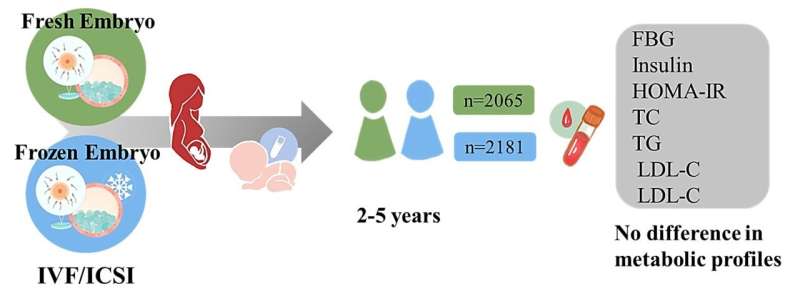This article has been reviewed according to Science X's editorial process and policies. Editors have highlighted the following attributes while ensuring the content's credibility:
fact-checked
peer-reviewed publication
trusted source
proofread
Metabolic parameters found to be similar in children born via frozen versus fresh embryo transfer, research shows

Children born via frozen embryo transfer have similar metabolic profiles to those born via fresh embryo transfer, according to a study published June 6 in the open-access journal PLOS Medicine by Linlin Cui and Zi-Jiang Chen from Shandong University, China, and colleagues.
Prior studies have shown inconsistent results on the long-term metabolic health impacts of assisted reproductive technology. Some have shown that children born via frozen embryo transfer have a higher risk of metabolic disorders, such as obesity, and unfavorable lipid profiles. Other studies have failed to find any significant metabolic differences between those born via frozen or fresh embryo transfer.
In this study, researchers compared the glucose and lipid profiles of more than 4,000 children between 2 and 5 years of age—approximately half had been born via fresh embryo transfer and half had been born via frozen embryo transfer.
Researchers followed the children for an average of 3.6 years and assessed metabolic factors often associated with heart disease and diabetes, such as fasting blood glucose, insulin, cholesterol, and triglycerides.
They found no difference in any of the metabolic factors between children born via fresh embryo transfer and those born via frozen embryo transfer.
Given the relatively large number of participants in this study, the researchers were able to conduct subgroup analyses. After dividing the children into groups based on gender, age, embryo transfer state, and method of conception, there were still no differences in metabolic factors among the frozen and fresh embryo transfer groups.
The study provides more information to women and couples weighing the pros and cons of different techniques offered for assisted reproduction, but the researchers noted the need for additional data on the effect of assisted reproductive technology on long-term metabolic health.
The authors add, "Frozen embryo transfer shows no significant adverse effects on metabolic profiles in early childhood, providing crucial evidence for counseling couples undergoing assisted reproductive technology treatment on its safety."
More information: Zhou W, Feng W, Chang J, Hu J, Li F, Hu K, et al. Metabolic profiles of children aged 2–5 years born after frozen and fresh embryo transfer: A Chinese cohort study, PLoS Medicine (2024). DOI: 10.1371/journal.pmed.1004388



















